Dale C. Allison, Jr.
WILLIAM B. EERDMANS PUBLISHING COMPANY
GRAND RAPIDS, MICHIGAN / CAMBRIDGE, U.K.



For Ron Tappy
In friendship
ix
 have, for many years now, involved myself in the so-called quest of the historical Jesus. During most of that time, the religious implications of my activities have been at the margin of my awareness. Despite being a lifelong churchgoer, my self-conception has usually been that of a historian writing to historians, not of a Christian writing to Christians. Moved by curiosity and the attendant joy of discovery, and desiring to evaluate the evidence honestly, whatever the outcome, I have sought to learn, through historical-critical methods, what I can about the first-century Jew Jesus of Nazareth.
have, for many years now, involved myself in the so-called quest of the historical Jesus. During most of that time, the religious implications of my activities have been at the margin of my awareness. Despite being a lifelong churchgoer, my self-conception has usually been that of a historian writing to historians, not of a Christian writing to Christians. Moved by curiosity and the attendant joy of discovery, and desiring to evaluate the evidence honestly, whatever the outcome, I have sought to learn, through historical-critical methods, what I can about the first-century Jew Jesus of Nazareth.
I have never been without theological motives or interests. Until a few years ago, however, I had not attempted to pursue those interests with much diligence or to examine my motives with much care. Recent circumstances have pushed me out of my historical-critical pose. After accepting a teaching post at a Protestant theological seminary, I soon discovered that future pastors are not interested in undertaking historical labor without the prospect of theological reward. In order, then, to keep my audience, I was compelled to complement my critical inquiries with theological deliberations.
The participants included not only well-known biblical scholars - Gary Anderson, Markus Bockmuehl, Beverly Gaventa, Kathy Grieb, Richard Hays, Joel Marcus, Walter Moberly, Marianne Meye Thompson, and Francis Watson - but also prominent theologians and historians of doctrine - Sarah Coakley, Brian Daley, Robert Jenson, Bill Placher, Katherine Sonderegger, and David Steinmetz. Sitting around the table with these engaging folk enabled me to develop thoughts that had theretofore remained only embryonic and to jettison others that failed to endure critical scrutiny. I am grateful for all they have taught me and encouraged me to ponder.
I wrote this book in preparation for the Kenneth W. Clark lectures, which I delivered at Duke University in February of 20o8, and I should like to thank Douglas Campbell, Stephen Carlson, Susan Eastman, Richard Hays, Joel Marcus, Jacquelyn Norris, and Kavin Rowe for their hospitality on that occasion. This book retains the informal character of my oral presentations. Joel has also kindly read and commented on parts of the manuscript, as have Kathy Anderson, Chris Kettler, Nancy Klancher, Tom Meredith, two of my children, Emily and John, and my wife, Kristine. I have tried to be their student.
"One does not solve this problem. One can only bear witness to it."
RICHARD GALE
It may be necessary to live with uncertainty as an alternative to living with a closed mind."
DAVID HAY
 or almost seventeen hundred years, Christians regarded the four canonical Gospels as being, among other things, records of what actually happened. Divine inspiration seemed to guarantee historical veracity, as did the belief that the purported authors of those Gospels, Matthew, Mark, Luke, and John, were either eyewitnesses or friends of eyewitnesses. An additional reason for trust was the supposition that the evangelical stories fulfill many of the messianic oracles in the Jewish Bible. The upshot was the conviction that Jesus said and did everything that the Gospels have him say and do. To read them was to encounter him as he once walked upon the earth.
or almost seventeen hundred years, Christians regarded the four canonical Gospels as being, among other things, records of what actually happened. Divine inspiration seemed to guarantee historical veracity, as did the belief that the purported authors of those Gospels, Matthew, Mark, Luke, and John, were either eyewitnesses or friends of eyewitnesses. An additional reason for trust was the supposition that the evangelical stories fulfill many of the messianic oracles in the Jewish Bible. The upshot was the conviction that Jesus said and did everything that the Gospels have him say and do. To read them was to encounter him as he once walked upon the earth.
There were, to be sure, moderating voices. Some, such as the church fathers Papias and Jerome, were fully aware that the Gospels do not agree on the order in which events happened. So too the medieval Syriac commentator Dionysius bar Salibi and the sixteenth-century Spanish exegete Maldonatus. The latter observed that "the Evangelists, like the other biblical authors, do not follow chronological order" and further Luther thought that Mark 13, the eschatological discourse, is a bit misleading because it does not preserve the order of the words as Jesus spoke them.
Despite the observations of Origen and a few other attentive readers, serious doubt over the historical fidelity of the canonical Gospels never, to my knowledge, assailed anyone in the ancient or medieval church.
Outside the church, there was more than doubt. Jews who disbelieved in Jesus as their promised Messiah did not, if the subject came up, credit the Christian stories about him. We accordingly find that old Jewish sources offer polemical alternatives. Surely Jesus must have been, as the Babylonian Talmud has it, a deceiver, a fraud who deliberately led Israel astray, and his followers must have been of the same unscrupulous character (Sanhedrin 43a). Already Matt. 28:11-15 reports that "the Jews" circulate a tale, originally concocted in desperation, in which the disciples, coming by night, steal their master's body. The later Toledoth Jesu, a medieval Jewish collection that purports to offer the real story behind the Christian stories, gives us more of the same: Mary was impregnated by a Roman soldier, Jesus was a magician in league with demonic hosts, the disciples staged the resurrection, and so on.
The contradictory alternatives of the Christian apologists and their Jewish antagonists no longer exhaust the options for readers of the Gospels. A series of historic developments - the critical study of texts initiated during the Renaissance, the Protestant critiques of Roman Catholic tradition, the growing secularism in the wake of the wars of religion, and the skepticism of tradition that attended the Enlightenment - conspired to fashion new ways of understanding the Scriptures, not only outside the churches but also within them; and those new ways eventually led, perhaps inevitably, to the modern quest for the historical Jesus.
So the author of the present book need not become a cartographer of the discipline. My subject is rather another: What are the religious implications of the quest?
Remarkably, many pew-sitters are happily oblivious of what has been going on in the thinking world for two and a half centuries. They have somehow avoided most or even all of the serious intellectual commentary on the Gospels since the Enlightenment. Perhaps typical are the two churches I grew up in, one Presbyterian, one Congregationalist. Never in Sunday School or from the pulpit did I hear anything of the modern debates surrounding Jesus and the Gospels.

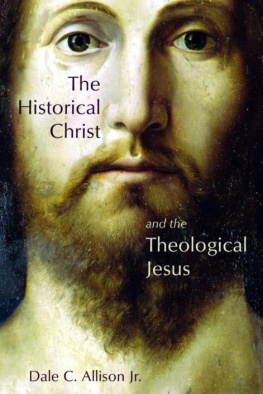
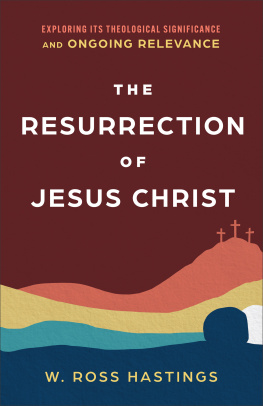

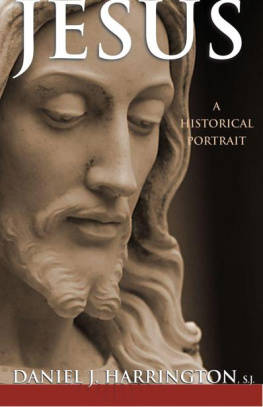


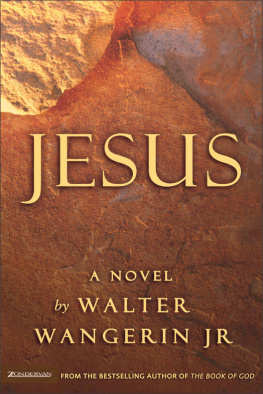
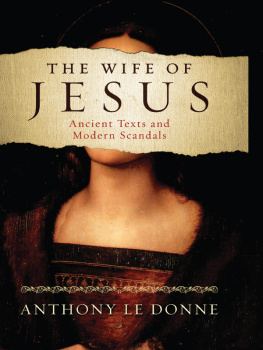

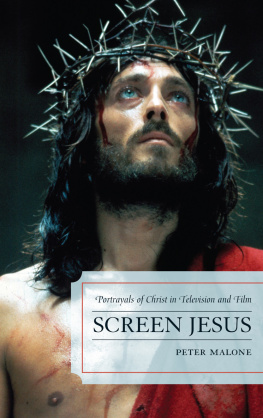











 have, for many years now, involved myself in the so-called quest of the historical Jesus. During most of that time, the religious implications of my activities have been at the margin of my awareness. Despite being a lifelong churchgoer, my self-conception has usually been that of a historian writing to historians, not of a Christian writing to Christians. Moved by curiosity and the attendant joy of discovery, and desiring to evaluate the evidence honestly, whatever the outcome, I have sought to learn, through historical-critical methods, what I can about the first-century Jew Jesus of Nazareth.
have, for many years now, involved myself in the so-called quest of the historical Jesus. During most of that time, the religious implications of my activities have been at the margin of my awareness. Despite being a lifelong churchgoer, my self-conception has usually been that of a historian writing to historians, not of a Christian writing to Christians. Moved by curiosity and the attendant joy of discovery, and desiring to evaluate the evidence honestly, whatever the outcome, I have sought to learn, through historical-critical methods, what I can about the first-century Jew Jesus of Nazareth.

 or almost seventeen hundred years, Christians regarded the four canonical Gospels as being, among other things, records of what actually happened. Divine inspiration seemed to guarantee historical veracity, as did the belief that the purported authors of those Gospels, Matthew, Mark, Luke, and John, were either eyewitnesses or friends of eyewitnesses. An additional reason for trust was the supposition that the evangelical stories fulfill many of the messianic oracles in the Jewish Bible. The upshot was the conviction that Jesus said and did everything that the Gospels have him say and do. To read them was to encounter him as he once walked upon the earth.
or almost seventeen hundred years, Christians regarded the four canonical Gospels as being, among other things, records of what actually happened. Divine inspiration seemed to guarantee historical veracity, as did the belief that the purported authors of those Gospels, Matthew, Mark, Luke, and John, were either eyewitnesses or friends of eyewitnesses. An additional reason for trust was the supposition that the evangelical stories fulfill many of the messianic oracles in the Jewish Bible. The upshot was the conviction that Jesus said and did everything that the Gospels have him say and do. To read them was to encounter him as he once walked upon the earth.